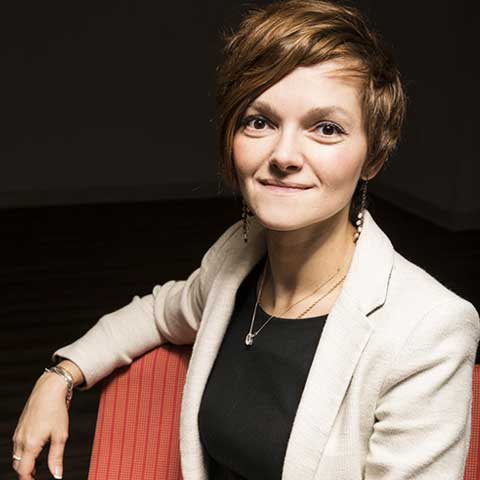Reward enhances connectivity between the ventral striatum and the default mode network

the Center for Traumatic Brain Injury Research
and director of the Neuromotivation and Network
Integrity Laboratory at Kessler Foundation
.
Novel analysis shows the experience of reward increases connectivity between the default mode network and other brain regions.
Findings support role of the default mode network in guiding goal-directed behavior and value-based decision making.
East Hanover, NJ. September 16, 2022. Researchers have reported findings that add to our knowledge of how human behavior may be shaped by the default mode network, a specific network of brain regions with both resting and task-related states. The article, "Reward enhances connectivity between the ventral striatum and the default mode network," (doi: 10.1016/j.neuroimage.2022.119398) was epublished on June 18, 2022, in NeuroImage.
The authors are Ekaterina Dobryakova, PhD, of Kessler Foundation and David V. Smith, PhD, of Temple University. The open access article is available at: https://www.sciencedirect.com/science/article/pii/S1053811922005158.
The default mode network (DMN), which comprises the posterior medial cortex, medial prefrontal cortex, and lateral temporal-parietal regions, has been shown to be engaged in several task-related behaviors. Studies show that DMN activity increases during inward-directed thought and decreases during externally directed tasks requiring focused attention. Despite evidence for a role for the DMN in shaping behavior, little is known about how task-related changes in the DMN influence connectivity with other brain regions. For example, while some observations indicate an indirect relationship between the DMN and the striatum, how the DMN and striatum interact during tasks remains unclear.
To further explore the functions of the DMN, Drs. Dobryakova and Smith applied a novel analysis to the reward task, using behavioral and neuroimaging data from 495 randomly selected individuals in the Human Connectome Project, an open access database of healthy participants. The goals of this network-based psycho-physiological interaction analysis were twofold, according to Dr. Dobryakova, a senior research scientist in the Foundation’s Center for Traumatic Brain Injury Research. “First, to test the effects of reward on connectivity between the DMN and the striatum; and second, whether such connectivity is associated with behavioral and personality characteristics relevant to reward processing,” she explained.
In line with other studies, during the task, they observed decreased activation of the DMN and relative increased activation of other networks. “Most notably, we found that the experience of reward enhanced connectivity between the DMN and the ventral striatum,” Dr. Dobryakova reported, “an effect specific to the DMN. We were also surprised that the strength of this connectivity correlated with personality characteristics relating to openness,” she added.
Greater understanding of the workings of the healthy brain will influence future research and care for individuals with neuropsychiatric syndromes. “Improving our understanding of the interaction of the DMN with other brain networks has the potential to aid clinical research into better treatments for common syndromes such as depression, substance abuse, and schizophrenia,” Dr. Dobryakova concluded.
Citation: Dobryakova E, Smith DV. Reward enhances connectivity between the ventral striatum and the default mode network. Neuroimage. 2022 Sep;258:119398. doi: 10.1016/j.neuroimage.2022.119398. Epub 2022 Jun 18. PMID: 35724856; PMCID: PMC9343171
This research was supported by grants from the National Institutes of Health grants R21-MH113917 (DVS), R03-DA046733 (DVS), RF1-AG067011 (DVS), R01-NS121107 (ED).
About Kessler Foundation
Kessler Foundation, a major nonprofit organization in the field of disability, is a global leader in rehabilitation research that seeks to improve cognition, mobility, and long-term outcomes, including employment, for people with neurological disabilities caused by diseases and injuries of the brain and spinal cord. Kessler Foundation leads the nation in funding innovative programs that expand opportunities for employment for people with disabilities.